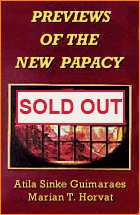International Affairs
 |
 |
 |
 |
 |
 |
 |
Francis, the Nuncio & the Tyrant
In one of the most significant symbolic moves of Vatican Ostpolitik favoring Cuban Communism, Pope Francis received tyrant Raul Castro in an ambience of mutual smiles and cordiality, shaking his blood-stained hands and asking the communist leader for prayers. This is a chilling and appalling scene before God and History, and one that will indelibly mark the current pontificate.
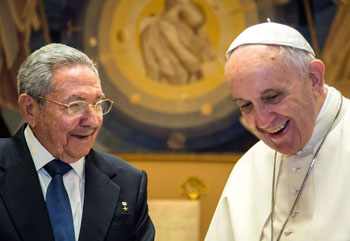 “As I have told Cuban leaders, I read all the Pope’s speeches and especially the comments he makes. And if the Pope continues speaking like this, I will begin to pray and will return to the Church. And I am not joking” (Buenos Aires, May 11, 2015, p. 12). These were the phrases uttered by the dictator that attracted the most attention.
“As I have told Cuban leaders, I read all the Pope’s speeches and especially the comments he makes. And if the Pope continues speaking like this, I will begin to pray and will return to the Church. And I am not joking” (Buenos Aires, May 11, 2015, p. 12). These were the phrases uttered by the dictator that attracted the most attention.
To leave no doubt about his continuing tenets, the tyrant reaffirmed his status as a “communist of the Cuban Communist Party” (Radio Havana, Cuba, May 10, 2015).
Castro cynically recalled that Cuban Catholics can belong to the Cuban Communist Party as if their positions were not doctrinally opposed and mutually exclusive. And he let it slip that he had recently spoken with the egregious Frei Betto, a leading proponent of Liberation Theology, personal friend of Fidel Castro and author of the book Fidel and Religion (Vatican Insider, Rome, May 10, 2015).
‘We will make apostates, not martyrs’
Raul Castro’s perhaps inadvertent allusion to Frei Betto is important for us to know the background of the tyrant’s statements in Rome. According to his book-interview, Frei Betto explained to Fidel Castro that the best tactic to employ with Catholics was not to persecute them and turn them into martyrs, but to integrate them into the Communist Revolution around goals supposedly common to Catholics and communists.
Fidel already had an intuition about that. In a speech some years ago at the University of Havana he had already made this Machiavellian rectification: “We will not fall in the historical error of sowing the way with Christian martyrs, as we well know that martyrdom was precisely what strengthened the Church. We will make apostates, thousands of apostates” (apud Juan Clark, Cuba: Mito y Realidad, Miami-Caracas: Editions Saeta, 1990, pp. 358, 658).
In order to effect this strategic correction with the purpose of making apostates, they went so far as to reform the Communist Constitution itself to allow Catholics into the Communist Party. Its misleading Article 54 guarantees everyone the “right” to “profess” and “practice any religious belief” just as long as it is done “in compliance with the [Communist] law”...
Thus, the Constitution opened the Party’s doors to revolutionary Cuban Catholics, who actually went so far as to draw up a “theology of collaboration.” Fr. René David, Professor of Theology at the Havana Seminary, in a document titled “Towards a Theology and Pastoral Policy of Reconciliation in Cuba,” called for “reconciliation between Catholicism and Communism,” clarifying that the latter “should be considered as an ideology in which Atheism is by no means substantial but rather an accident” (Chrétiens de l'Est, n. 51, 3rd quarter 1986, suppl. #11, p. 33).
It is in view of this long process of Communist-Catholic convergence that one can understand how a communist leader such as Raul Castro remains a communist and a persecutor of genuine Christians and at the same time “professes” a “religious belief” that matches the goals of Communism, or at least fails to oppose this ideology which, in its own way, is a Satanic religion that hates God and His Commandments.
So, in his above-mentioned statements the condition Raul Castro places for his alleged “conversion” to materialize (“if the Pope continues speaking like this”) is truly shocking.
How far will Vatican ‘diplomacy’ go?
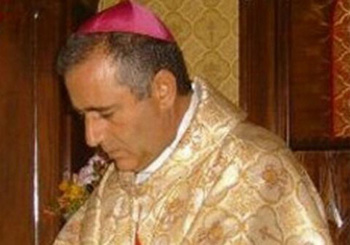 Implicitly, Castro is saying that Francis’ statements, which he reads and comments on with his henchmen, are moving toward communist goals or at least do not contradict them. Castro is ready to eventually return to a “church” that presents itself before his eyes in accordance with his own views diametrically opposed to Church doctrine, which declared Communism to be “satanic” and “intrinsically evil” (Pius XI, Encyclical Divini Redemptoris).
Implicitly, Castro is saying that Francis’ statements, which he reads and comments on with his henchmen, are moving toward communist goals or at least do not contradict them. Castro is ready to eventually return to a “church” that presents itself before his eyes in accordance with his own views diametrically opposed to Church doctrine, which declared Communism to be “satanic” and “intrinsically evil” (Pius XI, Encyclical Divini Redemptoris).
On the real situation of pressure and misery in Cuba, allow me to recall here the valiant, “politically incorrect” statements by the former Nuncio to Havana, Archbishop Bruno Musarò. He made them last year in his native country and after that – coincidentally or not – he was removed from the Nunciature in Cuba and appointed nuncio in Egypt.
Describing the Cuban people’s situation of degradation, poverty and oppression, Musarò said: “The State controls everything” and “the only hope is to escape the island.” He concluded by saying that, inexplicably, “up to this day, more than half a century later, they continue talking about Revolution and extolling it while people have no work and don’t know what to do to feed their children” (Lecce News, August 28, 2014).
All these hair-raising and appalling facts raise most serious questions not only about Dictator Castro and his henchmen but also about the substantive intent of Vatican diplomacy (Ostpolitik) regarding Cuban Communism and its objectives and goals. What is intended? How far will this go? What is the final goal to be reached? What are the consequences for the faith and the integrity of Catholic doctrine of attitudes so different from the Church’s traditional teaching on Communism as “satanic” and “intrinsically evil”?
It is no coincidence that during the course of the deplorable 1986 Cuban National Ecclesial Meeting, in which the Cuban Bishops went from dialogue and collaboration to actual concurrence with Communism and its socio-economic goals, the then Archbishop of Santiago de Cuba Pedro Meurice went so far as to recognize: “They used to consider us a Church of martyrs, but now tell us that we are a Church of traitors” (La Voz Católica, Archdiocese of Miami, March 14, 1986).
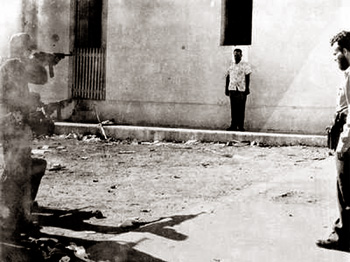
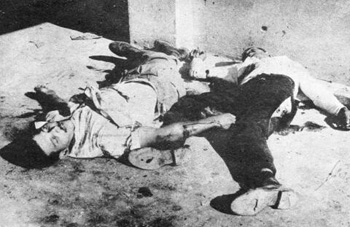 Cubans in exile have written books on the Vatican Ostpolitik with the Castro regime, describing this unfortunate process step by step. Two of these books, Dos Décadas de Aproximación Comuno-Católica en la Isla-Presídio del Caribe [Two Decades of Communist-Catholic Rapprochement on the Caribbean Island-Prison] and Cuba Comunista Después de la Visita Papal [Communist Cuba after the Papal Visit] can be downloaded for free in PDF format in links provided at the end of this article.
Cubans in exile have written books on the Vatican Ostpolitik with the Castro regime, describing this unfortunate process step by step. Two of these books, Dos Décadas de Aproximación Comuno-Católica en la Isla-Presídio del Caribe [Two Decades of Communist-Catholic Rapprochement on the Caribbean Island-Prison] and Cuba Comunista Después de la Visita Papal [Communist Cuba after the Papal Visit] can be downloaded for free in PDF format in links provided at the end of this article.
I was even obliged in conscience to write dozens of articles on the subject, in a respectful but firm and well-documented fashion, exercising my right as any Catholic layman, since the Church is not a prison for the consciences of her children. Also, I have my articles on this lamentable Vatican Ostpolitik with communist Cuba published on the Internet.
The end result of Francis’ meeting with the tyrant is dramatic for Cubans inside and outside the island, who oppose the Castro dictatorship and yearn for Cuba’s freedom. Tyrant Raul Castro promised to “convert” if, from his revolutionary perspective, he keeps seeing coincidences with the speeches and comments of Pope Francis.
Meanwhile, in a diametrically opposite direction I recall with emotion that the cause of conversion of hundreds of Cuban political prisoners, including me, was to hear in the sinister prison of La Cabaña at the beginning of the communist revolution the heroic cries of young Catholics dying at the Paredon, the shooting wall, shouting “Viva Cristo Rey! Down with communism!”
That happened until the communists, realizing that the blood of martyrs was the seed of new Christians, began to gag the young people who were taken to the firing squad. This is what I narrate in my memoir about 22 years in the Island prison. For that reason I called my book Against All Hope, recalling Abraham's faith-filled phrase quoted by St. Paul, which remains of utmost relevance for Cubans yearning for freedom: “Abraham, having hoped against all hope ... was not weak in faith” (Rm 4:18 & 19).
Armando Valladares is a writer, painter and poet. He spent 22 years in political prisons in Cuba. He is the author of the bestseller
Against All Hope, which recounts the horror of Castro's prisons.
He was US ambassador to the UN Human Rights Commission under the Reagan and Bush administrations. He received the Presidential Citizens Medal and Superior Award of the State Department. He has written numerous articles on the collaboration of the Church with Cuban Communism and the Vatican “Ostpolitik” towards Cuba.


Francis and Raul Castro in perfect accord at the Vatican meeting
To leave no doubt about his continuing tenets, the tyrant reaffirmed his status as a “communist of the Cuban Communist Party” (Radio Havana, Cuba, May 10, 2015).
Castro cynically recalled that Cuban Catholics can belong to the Cuban Communist Party as if their positions were not doctrinally opposed and mutually exclusive. And he let it slip that he had recently spoken with the egregious Frei Betto, a leading proponent of Liberation Theology, personal friend of Fidel Castro and author of the book Fidel and Religion (Vatican Insider, Rome, May 10, 2015).
‘We will make apostates, not martyrs’
Raul Castro’s perhaps inadvertent allusion to Frei Betto is important for us to know the background of the tyrant’s statements in Rome. According to his book-interview, Frei Betto explained to Fidel Castro that the best tactic to employ with Catholics was not to persecute them and turn them into martyrs, but to integrate them into the Communist Revolution around goals supposedly common to Catholics and communists.
Fidel already had an intuition about that. In a speech some years ago at the University of Havana he had already made this Machiavellian rectification: “We will not fall in the historical error of sowing the way with Christian martyrs, as we well know that martyrdom was precisely what strengthened the Church. We will make apostates, thousands of apostates” (apud Juan Clark, Cuba: Mito y Realidad, Miami-Caracas: Editions Saeta, 1990, pp. 358, 658).
In order to effect this strategic correction with the purpose of making apostates, they went so far as to reform the Communist Constitution itself to allow Catholics into the Communist Party. Its misleading Article 54 guarantees everyone the “right” to “profess” and “practice any religious belief” just as long as it is done “in compliance with the [Communist] law”...
Thus, the Constitution opened the Party’s doors to revolutionary Cuban Catholics, who actually went so far as to draw up a “theology of collaboration.” Fr. René David, Professor of Theology at the Havana Seminary, in a document titled “Towards a Theology and Pastoral Policy of Reconciliation in Cuba,” called for “reconciliation between Catholicism and Communism,” clarifying that the latter “should be considered as an ideology in which Atheism is by no means substantial but rather an accident” (Chrétiens de l'Est, n. 51, 3rd quarter 1986, suppl. #11, p. 33).
It is in view of this long process of Communist-Catholic convergence that one can understand how a communist leader such as Raul Castro remains a communist and a persecutor of genuine Christians and at the same time “professes” a “religious belief” that matches the goals of Communism, or at least fails to oppose this ideology which, in its own way, is a Satanic religion that hates God and His Commandments.
So, in his above-mentioned statements the condition Raul Castro places for his alleged “conversion” to materialize (“if the Pope continues speaking like this”) is truly shocking.
How far will Vatican ‘diplomacy’ go?

Archbishop Musaró: The Cuban people are ‘victims of a socialist dictatorship that kept them subjugated for the last 56 years’
On the real situation of pressure and misery in Cuba, allow me to recall here the valiant, “politically incorrect” statements by the former Nuncio to Havana, Archbishop Bruno Musarò. He made them last year in his native country and after that – coincidentally or not – he was removed from the Nunciature in Cuba and appointed nuncio in Egypt.
Describing the Cuban people’s situation of degradation, poverty and oppression, Musarò said: “The State controls everything” and “the only hope is to escape the island.” He concluded by saying that, inexplicably, “up to this day, more than half a century later, they continue talking about Revolution and extolling it while people have no work and don’t know what to do to feed their children” (Lecce News, August 28, 2014).
All these hair-raising and appalling facts raise most serious questions not only about Dictator Castro and his henchmen but also about the substantive intent of Vatican diplomacy (Ostpolitik) regarding Cuban Communism and its objectives and goals. What is intended? How far will this go? What is the final goal to be reached? What are the consequences for the faith and the integrity of Catholic doctrine of attitudes so different from the Church’s traditional teaching on Communism as “satanic” and “intrinsically evil”?
It is no coincidence that during the course of the deplorable 1986 Cuban National Ecclesial Meeting, in which the Cuban Bishops went from dialogue and collaboration to actual concurrence with Communism and its socio-economic goals, the then Archbishop of Santiago de Cuba Pedro Meurice went so far as to recognize: “They used to consider us a Church of martyrs, but now tell us that we are a Church of traitors” (La Voz Católica, Archdiocese of Miami, March 14, 1986).

El Paredón, the killing wall where Catholics died shouting Viva Cristo Rey!

I was even obliged in conscience to write dozens of articles on the subject, in a respectful but firm and well-documented fashion, exercising my right as any Catholic layman, since the Church is not a prison for the consciences of her children. Also, I have my articles on this lamentable Vatican Ostpolitik with communist Cuba published on the Internet.
The end result of Francis’ meeting with the tyrant is dramatic for Cubans inside and outside the island, who oppose the Castro dictatorship and yearn for Cuba’s freedom. Tyrant Raul Castro promised to “convert” if, from his revolutionary perspective, he keeps seeing coincidences with the speeches and comments of Pope Francis.
Meanwhile, in a diametrically opposite direction I recall with emotion that the cause of conversion of hundreds of Cuban political prisoners, including me, was to hear in the sinister prison of La Cabaña at the beginning of the communist revolution the heroic cries of young Catholics dying at the Paredon, the shooting wall, shouting “Viva Cristo Rey! Down with communism!”
That happened until the communists, realizing that the blood of martyrs was the seed of new Christians, began to gag the young people who were taken to the firing squad. This is what I narrate in my memoir about 22 years in the Island prison. For that reason I called my book Against All Hope, recalling Abraham's faith-filled phrase quoted by St. Paul, which remains of utmost relevance for Cubans yearning for freedom: “Abraham, having hoped against all hope ... was not weak in faith” (Rm 4:18 & 19).
Posted June 1, 2015
He was US ambassador to the UN Human Rights Commission under the Reagan and Bush administrations. He received the Presidential Citizens Medal and Superior Award of the State Department. He has written numerous articles on the collaboration of the Church with Cuban Communism and the Vatican “Ostpolitik” towards Cuba.

______________________
______________________











